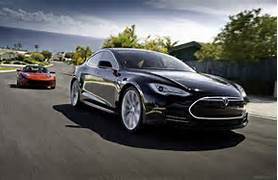Imagine a product that performs so well, that an evaluator says it busted through the top of its grade scale, yet that same scorer can’t recommend the product due to issues of reliability.
That would be a seeming disconnect in the real world, but in this case we are talking about the immortal Tesla Model S. The illogical appraiser is Consumer Reports.
Two years ago the media enthusiastically reported how the all-electric luxury vehicle scored a 99 out of 100, as measured by conscientious buyers’ favorite magazine. Then, two months ago, CR’s researchers were even more ecstatic after their follow-up tests, and awarded the Model S a score of 103. Green-minded journalists were over the moon.
“This is a glimpse into what we can expect down the line, where we have cars with the performance of supercars and the comfort, convenience and safety features of a luxury car while still being extremely energy efficient,” said Jake Fisher, head of the magazine’s automotive testing, to theSydney Morning Herald at the time. “We haven’t seen all those things before.”
The Twilight Zone that is Tesla is where many things – often ones that defy logic and/or the laws of economics – haven’t been seen before, such as skyrocketing stock prices despite ongoing financial losses. But here’s one that no mind could have imagined: The effusive Consumer Reports graders have rescinded their recommendation of the Model S.
How and why? The actual owners of the vehicles have spoken, via approximately 1,400 survey responses received by the magazine. The results showed that the Model Ss are “likely to involve a worse-than-average overall problem rate” that affect reliability. Among the glitches were issues with the drive train, power equipment, charging equipment, giant iPad-like center console, and body and sunroof squeaks, rattles, and leaks. It all sounds quite Fisker–esque.
Consumer Reports’ auto-testing guru had to curb his enthusiasm.
“This extensive data allows us to forecast that owning a Tesla will likely mean worse than average reliability, a decline from last years average prediction,” Fisher said. “As a result the Model S will not receive the ‘recommended’ designation, even though it did so well in our separate road test evaluations. To be recommended a vehicle has to meet stringent testing, reliability, and safety standards, including having average or better predicted reliability.”
There was a bright spot in the survey feedback, however. Model S owners reported that Tesla’s customer service was excellent, to the point that 97 percent of owners said they’d buy again. Nonetheless the value of Tesla’s stock dropped 14 percent from one month ago, and has fallen 20 percent in less than three months.
The share price still closed in silly territory (for an unproven automotive tech start-up) yesterday at $215.26, however. The Tesla experience, as mentioned earlier, defies logic. Compare what has happened in the eyes of Consumer Reports with the Model S, for example, to how it viewed its experience with a similar (but failed) luxury electric automobile, the Fisker Karma.
“With the Karma,” the magazine reported in September 2012, “much attention has been paid to our unfortunately routine problems, including an early failure on our track that left the car immobile and led to the battery being replaced, frequent instrument, window and radio glitches, and recurring warning lights. So far our Karma has made multiple trips back to the dealer (who, by the way, has provided excellent service, flat-bedding the car to and from our facility).”
So, both vehicles had all kinds of troubles (also left unmentioned are the battery-related fires that both have experienced) – but had excellent customer service! The major difference is that the Karma showcased many of its problems on Consumer Reports’ test track, while the negatives for the Model S were revealed by its owners – arguably worse because it’s a wider sampling of customer complaints. Yet the Karma received a magazine designation as the “worst luxury sedan” in 2012, and fourth-worst sedan overall. Fisker, which lost $139 million of U.S. taxpayers’ money, went bankrupt in late 2013 and its remnants were sold off to the Chinese.
Meanwhile Tesla, despite the recent stock devaluation, still is riding high. As NLPC has reported the last couple of years, despite ongoingdependence on government subsidies and regulatory favor, Tesla has had repeated financial losses in its quarterly earnings. Nevertheless the company and CEO Elon Musk enjoy nearly universal acclaim from the media and Wall Street analysts.
Musk, a master of redirection when confronted with bad news, was ready again with a rapid response to the Consumer Reports rescindment. He said, more or less, that the development was old news.
“Consumer Reports reliability survey includes a lot of early production cars,” Musk said, on Twitter. “Already addressed in new cars.”
He emphasized the owners’ positive response on customer service and called the 97 percent interest in buying again “the acid test” of approval. Yet the magazine identified areas that scored worse in 2015 than did the 2014 model in last year’s survey, which included climate control, steering and suspension systems. Complaints about the drive system in the 2013 models increased as well.
Nonetheless some analysts were not fazed. Karl Brauer of Kelly Blue Book said owners don’t worry about “little issues,” and an investment bank analyst said the problems were already known among Tesla loyalists. Just call them Teflon Tesla.
Paul Chesser is an associate fellow for the National Legal and Policy Center and publishes CarolinaPlottHound.com, an aggregator of North Carolina news.
[Originally published at the National Legal and Policy Center]





